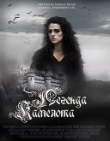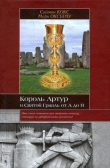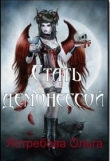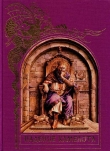Волшебница Шалотт и другие стихотворения
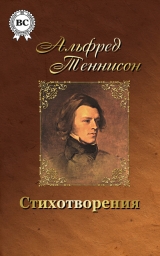
Текст книги "Волшебница Шалотт и другие стихотворения"
Автор книги: Альфред Теннисон
Жанр:
Поэзия
сообщить о нарушении
Текущая страница: 4 (всего у книги 14 страниц) [доступный отрывок для чтения: 6 страниц]
TITHONUS
The woods decay, the woods decay and fall,
The vapours weep their burthen to the ground,
Man comes and tills the field and lies beneath,
And after many a summer dies the swan.
Me only cruel immortality
Consumes: I wither slowly in thine arms,
Here at the quiet limit of the world,
A white-hair’d shadow roaming like a dream
The ever-silent spaces of the East,
Far-folded mists, and gleaming halls of morn.
Alas! for this gray shadow, once a man —
So glorious in his beauty and thy choice,
Who madest him thy chosen, that he seem’d
To his great heart none other than a God!
I ask’d thee, ‘Give me immortality.’
Then didst thou grant mine asking with a smile,
Like wealthy men who care not how they give.
But thy strong Hours indignant work’d their wills,
And beat me down and marr’d and wasted me,
And tho’ they could not end me, left me maim’d
To dwell in presence of immortal youth,
Immortal age beside immortal youth,
And all I was, in ashes. Can thy love,
Thy beauty, make amends, tho’ even now,
Close over us, the silver star, thy guide,
Shines in those tremulous eyes that fill with tears
To hear me? Let me go: take back thy gift:
Why should a man desire in any way
To vary from the kindly race of men,
Or pass beyond the goal of ordinance
Where all should pause, as is most meet for all?
A soft air fans the cloud apart; there comes
A glimpse of that dark world where I was born.
Once more the old mysterious glimmer steals
From thy pure brows, and from thy shoulders pure,
And bosom beating with a heart renew’d.
Thy cheek begins to redden thro’ the gloom,
Thy sweet eyes brighten slowly close to mine,
Ere yet they blind the stars, and the wild team
Which love thee, yearning for thy yoke, arise,
And shake the darkness from their loosen’d manes,
And beat the twilight into flakes of fire.
Lo! ever thus thou growest beautiful
In silence, then before thine answer given
Departest, and thy tears are on my cheek.
Why wilt thou ever scare me with thy tears,
And make me tremble lest a saying learnt,
In days far-off, on that dark earth, be true?
‘The Gods themselves cannot recall their gifts.’
Ay me! ay me! with what another heart
In days far-off, and with what other eyes
I used to watch – if I be he that watch’d —
The lucid outline forming round thee; saw
The dim curls kindle into sunny rings;
Changed with thy mystic change, and felt my blood
Glow with the glow that slowly crimson’d all
Thy presence and thy portals, while I lay,
Mouth, forehead, eyelids, growing dewy-warm
With kisses balmier than half-opening buds
Of April, and could hear the lips that kiss’d
Whispering I knew not what of wild and sweet,
Like that strange song I heard Apollo sing,
While Ilion like a mist rose into towers.
Yet hold me not for ever in thine East:
How can my nature longer mix with thine?
Coldly thy rosy shadows bathe me, cold
Are all thy lights, and cold my wrinkled feet
Upon thy glimmering thresholds, when the steam
Floats up from those dim fields about the homes
Of happy men that have the power to die,
And grassy barrows of the happier dead.
Release me, and restore me to the ground;
Thou seёst all things, thou wilt see my grave:
Thou wilt renew thy beauty morn by morn;
I earth in earth forget these empty courts,
And thee returning on thy silver wheels.
ТИФОН
Леса гниют, гниют и облетают,
И тучи, плача, ливнями исходят,
Устав пахать, ложится в землю пахарь,
Пресытясь небом, умирает лебедь.
И лишь меня жестокое бессмертье
Снедает: медленно я увядаю
В твоих объятьях на краю Вселенной, —
Седая тень, бродящая в тумане
Средь вечного безмолвия Востока,
В жемчужных, тающих чертогах утра.
Увы! седоголовый этот призрак
Когда-то был мужчиной, полным силы.
Избранник твой, он сам себе казался
Богоподобным, гордым и счастливым.
Он попросил тебя: «Дай мне бессмертье!»
И ты дала просимое с улыбкой,
Как богачи дают – легко, небрежно.
Но не дремали мстительные Оры:
Бессильные сгубить, они меня
Обезобразили, к земле пригнули
И, дряхлого, оставили томиться
Близ юности бессмертной. Чем ты можешь,
Любовь моя, теперь меня утешить
В сей миг, когда рассветная звезда
Мерцает и дрожит в твоих глазах,
Наполненных слезами. Отпусти!
Возьми назад свой дар: к чему попытки
Уйти от общей участи людской
И преступить черту, где должен всякий
Остановиться и принять судьбу,
Дарованную небом человеку.
Вдали, в просветах облачных забрезжил
Тот темный мир, в котором я родился.
И вновь зажглись таинственным свеченьем
Твой чистый лоб и скаты нежных плеч,
И грудь, где сердце бьется обновленно.
Вновь разгораются румянцем щеки,
И влажные твои глаза – так близко
К моим! – сверкают ярче. Звезды гаснут
Пред ними, и влюбленная упряжка
Неистовых твоих коней хрипит,
Вздымаясь на дыбы, и отрясает
Ночь с грив своих – и пышет пылом утра.
Любовь моя! вот так ты каждый раз
Преображаешься – и ускользаешь,
Оставив слезы на моей щеке.
Зачем меня пугаешь ты слезами? —
Не для того ль, чтоб я, дрожа, припомнил
Слова, произнесенные однажды:
«Своих даров не отменяют боги».
Увы! увы! Не так я трепетал
В былые дни, другими я очами
Тогда смотрел – и я ли это был? —
На разгорающийся ореол
Вкруг тела твоего, на вспышки солнца
В твоих кудрях – и сам преображался
С тобой – и чувствовал, как в кровь мою
Вливается тот отблеск розоватый,
Которым ты так властно облекалась,
И ощущал губами, лбом, глазами
Касанье губ твоих – благоуханней
Апрельских первых лепестков! – и слышал
Твой шепот жаркий, сладостный и странный,
Как Аполлона радостная песнь
В тот день, когда воздвиглись башни Трои.
О, отпусти меня! нельзя навеки
С твоим восходом сочетать закат.
Я мерзну в этих теплых волнах света,
В твоих ласкающих лучах, я мерзну,
Ногами зябкими ступив на твой
Мерцающий порог в тот ранний час,
Когда восходит к небу пар белесый
С полей, где смертные живут свой век
Или, отжив, спокойно отдыхают.
Освободи, верни меня земле;
Всевидящая, с высоты своей
Призри на тихую мою могилу, —
Когда, истлев, навеки позабуду
Твоих пустых чертогов высоту,
Твою серебряную колесницу…
Г. Кружков
«BREAK, BREAK, BREAK»
Break, break, break
On thy cold stones, О Sea!
And I would that my tongue could utter
The thoughts that arise in me.
О well for the fisherman’s boy,
That he shouts with his sister at play!
О well for the sailor lad,
That he sings in his boat on the bay!
And the stately ships go on
To their haven under the hill,
But О for the touch of a vanish’d hand,
And the sound of a voice that is still!
Break, break, break
At the foot of thy crags, О Sea!
But the tender grace of a day that is dead
Will never come back to me.
У МОРЯ
Бей, бей, бей
В берега, многошумный прибой!
Я хочу говорить о печали своей,
Непокойное море, с тобой.
Счастлив мальчик, который бежит по песку
К этим скалам, навстречу волне.
Хорошо и тому рыбаку,
Что поет свою песню в челне.
Возвращаются в гавань опять
Корабли, обошедшие свет.
Но как тяжко о мертвой руке тосковать,
Слышать голос, которого нет.
Бей, бей, бей
В неподвижные камни, вода!
Благодатная радость потерянных дней
Не вернется ко мне никогда.
С. Маршак
THE LOTOS-EATERS
‘Courage!’ he said, and pointed toward the land,
‘This mounting wave will roll us shoreward soon.’
In the afternoon they came unto a land
In which it seemed always afternoon.
All round the coast the languid air did swoon,
Breathing like one that hath a weary dream.
Full-faced above the valley stood the moon;
And like a downward smoke, the slender stream
Along the cliff to fall and pause and fall did seem.
A land of streams! some, like a downward smoke,
Slow-dropping veils of thinnest lawn,
And some thro’ wavering lights and shadows broke,
Rolling a slumbrous sheet of foam below.
They saw the gleaming river seaward flow
From the inner land: far off, three mountain-tops,
Three silent pinnacles of aged snow,
Stood sunset-flush’d: and, dew’d with showery drops,
Up-clomb the shadowy pine above the woven copse.
The charmed sunset linger’d low adown
In the red West: thro’ mountain clefts the dale
Was seen far inland, and the yellow down
Border’d with palm, and many a winding vale
And meadow, set with slender galingale;
A land where all things always seem’d the same!
And round about the keel with faces pale,
Dark faces pale against that rosy flame,
The mild-eyed melancholy Lotos-eaters came.
Branches they bore of that enchanted stem,
Laden with flower and fruit, whereof they gave
To each, but whoso did receive of them,
And taste, to him the gushing of the wave
Far far away did seem to mourn and rave
On alien shores; and if his fellow spake,
His voice was thin, as voices from the grave;
And deep-asleep he seem’d, yet all awake,
And music in his ears his beating heart did make.
They sat them down upon the yellow sand,
Between the sun and moon upon the shore;
And sweet it was to dream of Fatherland,
Of child, and wife, and slave; but evermore
Most weary seem’d the sea, weary the oar,
Weary the wandering fields of barren foam.
Then some one said, ‘We will return no more;’
And all at once they sang, ‘Our island home
Is far beyond the wave; we will no longer roam.’
ЛОТОФАГИ
«Смелей! – он крикнул, указав вперед,
Откуда шум прибоя доносился. —
Нас к берегу течением несет!»
Так экипаж спасенный очутился
На берегу, где вечный вечер длился
И полный месяц в вышине сиял;
Ласкаясь томно, ветерок струился;
А водопад дымился и сверкал —
И аркой хрусталя над морем застывал.
Страна ручьев! Одни сочились вниз
Каскадом капель, кружевным узором;
Другие через каменный карниз
Переливались шумно и с напором;
Широкая река предстала взорам;
А часть небес была заслонена
Высоким снежным пиком, за которым
Горел закат; и на скале сосна
Росой летучих брызг была окроплена.
Чарующий закат не остывал
На алом западе; между горами
Просвет открыто видеть позволял
За долом дол, как в светлой панораме,
И пальмы, и низины с камышами, —
Казалось, все застыло в той стране!
И бледны, с отрешенными очами,
Явились Лотофаги в тишине,
Задумчиво-грустны, как тени в смутном сне.
В руках они несли пучки цветов,
Плоды и стебли – той волшебной силы,
Что если кто их брал из моряков
И ел, – то делались ему постылы
И корабли, и моря шум унылый;
И если спрашивал о чем-то друг,
То голос глухо шел, как из могилы;
И сквозь дремоту он глядел вокруг;
И музыкой в ушах ему был сердца стук.
Садился он у моря, на песке,
Меж солнцем и луной посередине,
И родину воображал в тоске,
Своих детей, жену; но уж отныне
Страшился плыть по водяной пустыне,
Бороться с бурей, налегать веслом;
И что-то говорил еще о сыне…
Но эхо вторило ему: «Твой дом
За волнами далек; что вспоминать о нем!»
Г. Кружков
LOCKSLEY HALL
Comrades, leave me here a little, while as yet ’tis early morn:
Leave me here, and when you want me, sound upon the bugle-horn.
‘Tis the place, and all around it, as of old, the curlews call,
Dreary gleams about the moorland flying over Locksley Hall;
Locksley Hall, that in the distance overlooks the sandy tracts,
And the hollow ocean-ridges roaring into cataracts.
Many a night from yonder ivied casement, ere I went to rest,
Did I look on great Orion sloping slowly to the West.
Many a night I saw the Pleiads, rising thro’ the mellow shade,
Glitter like a swarm of fire-flies tangled in a silver braid.
Here about the beach I wander’d, nourishing a youth sublime
With the fairy tales of science, and the long result of Time;
When the centuries behind me like a fruitful land reposed;
When I clung to all the present for the promise that it closed:
When I dipt into the future far as human eye could see;
Saw the Vision of the world, and all the wonder that would be. —
In the Spring a fuller crimson comes upon the robin’s breast;
In the Spring the wanton lapwing gets himself another crest;
In the Spring a livelier iris changes on the burnish’d dove;
In the Spring a young man’s fancy lightly turns to thoughts of love.
Then her cheek was pale and thinner than should be for one so young,
And her eyes on all my motions with a mute observance hung.
And I said, ‘My cousin Amy, speak, and speak the truth to me,
Trust me, cousin, all the current of my being sets to thee.’
On her pallid cheek and forehead came a colour and a light,
As I have seen the rosy red flushing in the northern night.
And she turn’d – her bosom shaken with a sudden storm of sighs —
All the spirit deeply dawning in the dark of hazel eyes —
Saying, ‘I have hid my feelings, fearing they should do me wrong;’
Saying, ‘Dost thou love me, cousin?’ weeping, ‘I have loved thee long.’
Love took up the glass of Time, and turn’d it in his glowing hands;
Every moment, lightly shaken, ran itself in golden sands.
Love took up the harp of Life, and smote on all the chords with might;
Smote the chord of Self, that, trembling, pass’d in music out of sight.
Many a morning on the moorland did we hear the copses ring,
And her whisper throng’d my pulses with the fullness of the Spring.
Many an evening by the waters did we watch the stately ships,
And our spirits rush’d together at the touching of the lips.
О my cousin, shallow-hearted! О my Amy, mine no more!
О the dreary, dreary moorland! О the barren, barren shore!
Falser than all fancy fathoms, falser than all songs have sung,
Puppet to a father’s threat, and servile to a shrewish tongue!
Is it well to wish thee happy? – having known me – to decline
On a range of lower feelings and a narrower heart than mine!
Yet it shall be: thou shalt lower to his level day by day,
What is fine within thee growing coarse to sympathise with clay.
As the husband is, the wife is: thou art mated with a clown,
And the grossness of his nature will have weight to drag thee down.
He will hold thee, when his passion shall have spent its novel force,
Something better than his dog, a little dearer than his horse.
What is this? his eyes are heavy: think not they are glazed with wine.
Go to him: it is thy duty: kiss him: take his hand in thine.
It may be my lord is weary, that his brain is overwrought:
Soothe him with thy finer fancies, touch him with thy lighter thought.
He will answer to the purpose, easy things to understand —
Better thou wert dead before me, tho’ I slew thee with my hand!
Better thou and I were lying, hidden from the heart’s disgrace,
Roll’d in one another’s arms, and silent in a last embrace.
Cursed be the social wants that sin against the strength of youth!
Cursed be the social lies that warp us from the living truth!
Cursed be the sickly forms that err from honest Nature’s rule!
Cursed be the gold that gilds the straiten’d forehead of the fool!
Well – ‘tis well that I should bluster! – Hadst thou less unworthy proved —
Would to God – for I had loved thee more than ever wife was loved.
Am I mad, that I should cherish that which bears but bitter fruit?
I will pluck it from my bosom, tho’ my heart be at the root.
Never, tho’ my mortal summers to such length of years should come
As the many-winter’d crow that leads the clanging rookery home.
Where is comfort? in division of the records of the mind?
Can I part her from herself, and love her, as I knew her, kind?
I remember one that perish’d: sweetly did she speak and move:
Such a one do I remember, whom to look at was to love.
Can I think of her as dead, and love her for the love she bore?
No – she never loved me truly: love is love for evermore.
Comfort? comfort scorn’d of devils! this is truth the poet sings,
That a sorrow’s crown of sorrow is remembering happier things.
Drug thy memories, lest thou learn it, lest thy heart be put to proof,
In the dead unhappy night, and when the rain is on the roof.
Like a dog, he hunts in dreams, and thou art staring at the wall,
Where the dying night-lamp flickers, and the shadows rise and fall.
Then a hand shall pass before thee, pointing to his drunken sleep,
To thy widow’d marriage-pillows, to the tears that thou wilt weep.
Thou shalt hear the ‘Never, never,’ whisper’d by the phantom years,
And a song from out the distance in the ringing of thine ears;
And an eye shall vex thee, looking ancient kindness on thy pain.
Turn thee, turn thee on thy pillow: get thee to thy rest again.
Nay, but Nature brings thee solace; for a tender voice will cry.
’Tis a purer life than thine; a lip to drain thy trouble dry.
Baby lips will laugh me down: my latest rival brings thee rest.
Baby fingers, waxen touches, press me from the mother’s breast.
O, the child too clothes the father with a dearness not his due.
Half is thine and half is his: it will be worthy of the two.
О, I see thee old and formal, fitted to thy petty part,
With a little hoard of maxims preaching down a daughter’s heart.
‘They were dangerous guides the feelings – she herself was not exempt —
Truly, she herself had suffer’d’ – Perish in thy self contempt!
Overlive it – lower yet – be happy! wherefore should I care?
I myself must mix with action, lest I wither by despair.
What is that which I should turn to, lighting upon days like these?
Every door is barr’d with gold, and opens but to golden keys.
Every gate is throng’d with suitors, all the markets overflow.
I have but an angry fancy: what is that which I should do?
I had been content to perish, falling on the foeman’s ground,
When the ranks are roll’d in vapour, and the winds are laid with sound.
But the jingling of the guinea helps the hurt that Honour feels,
And the nations do but murmur, snarling at each other’s heels.
Can I but relive in sadness? I will turn that earlier page.
Hide me from my deep emotion, О thou wondrous Mother-Age!
Make me feel the wild pulsation that I felt before the strife,
When I heard my days before me, and the tumult of my life;
Yearning for the large excitement that the coming years would yield,
Eager-hearted as a boy when first he leaves his father’s field,
And at night along the dusky highway near and nearer drawn,
Sees in heaven the light of London flaring like a dreary dawn;
And his spirit leaps within him to be gone before him then,
Underneath the light he looks at, in among the throngs of men:
Men, my brothers, men the workers, ever reaping something new:
That which they have done but earnest of the things that they shall do:
For I dipt into the future, far as human eye could see,
Saw the Vision of the world, and all the wonder that would be;
Saw the heavens fill with commerce, argosies of magic sails,
Pilots of the purple twilight, dropping down with costly bales;
Heard the heavens fill with shouting, and there rain’d a ghastly dew
From the nations’ airy navies grappling in the central blue;
Far along the world-wide whisper of the south-wind rushing warm,
With the standards of the peoples plunging thro’ the thunder-storm;
Till the war-drum throbb’d no longer, and the battleflags were furl’d
In the Parliament of man, the Federation of the world.
There the common sense of most shall hold a fretful realm in awe,
And the kindly earth shall slumber, lapt in universal law.
So I triumph’d ere my passion sweeping thro’ me left me dry,
Left me with the palsied heart, and left me with the jaundiced eye;
Eye, to which all order festers, all things here are out of joint:
Science moves, but slowly slowly, creeping on from point to point:
Slowly comes a hungry people, as a lion creeping nigher,
Glares at one that nods and winks behind a slowly-dying fire.
Yet I doubt not thro’ the ages one increasing purpose runs,
And the thoughts of men are widen’d with the process of the suns.
What is that to him that reaps not harvest of his youthful joys,
Tho’ the deep heart of existence beat for ever like a boy’s?
Knowledge comes, but wisdom lingers, and I linger on the shore,
And the individual withers, and the world is more and more.
Knowledge comes, but wisdom lingers, and he bears a laden breast,
Full of sad experience, moving toward the stillness of his rest.
Hark, my merry comrades call me, sounding on the bugle-horn,
They to whom my foolish passion were a target for their scorn:
Shall it not be scorn to me to harp on such a moulder’d string?
I am shamed thro’ all my nature to have loved so slight a thing.
Weakness to be wroth with weakness! woman’s pleasure, woman’s pain —
Nature made them blinder motions bounded in a shallower brain:
Woman is the lesser man, and all thy passions, match’d with mine,
Are as moonlight unto sunlight, and as water unto wine —
Here at least, where nature sickens, nothing. Ah, for some retreat
Deep in yonder shining Orient, where my life began to beat;
Where in wild Mahratta-battle fell my father evil-starr’d; —
I was left a trampled orphan, and a selfish uncle’s ward.
Or to burst all links of habit – there to wander far away,
On from island unto island at the gateways of the day.
Larger constellations burning, mellow moons and happy skies,
Breadths of tropic shade and palms in cluster, knots of Paradise.
Never comes the trader, never floats an European flag,
Slides the bird o’er lustrous woodland, swings the trailer from the crag;
Droops the heavy-blossom’d bower, hangs the heavy-fruited tree —
Summer isles of Eden lying in dark-purple spheres of sea.
There methinks would be enjoyment more than in this march of mind,
In the steamship, in the railway, in the thoughts that shake mankind.
There the passions cramp’d no longer shall have scope and breathing-space;
I will take some savage woman, she shall rear my dusky race.
Iron-jointed, supple-sinew’d, they shall dive, and they shall run,
Catch the wild goat by the hair, and hurl their lances in the sun;
Whistle back the parrot’s call, and leap the rainbows of the brooks,
Not with blinded eyesight poring over miserable books —
Fool, again the dream, the fancy! but I knowmy words are wild,
But I count the gray barbarian lower than the Christian child.
I, to herd with narrow foreheads, vacant of our glorious gains,
Like a beast with lower pleasures, like a beast with lower pains!
Mated with a squalid savage – what to me were sun or clime?
I the heir of all the ages, in the foremost files of time —
I that rather held it better men should perish one by one,
Than that earth should stand at gaze like Joshua’s moon in Ajalon!
Not in vain the distance beacons. Forward, forward let us range,
Let the great world spin for ever down the ringing grooves of change.
Thro’ the shadow of the globe we sweep into the younger day:
Better fifty years of Europe than a cycle of Cathay.
Mother-Age (for mine I knew not) help me as when life begun:
Rift the hills, and roll the waters, flash the lightnings, weigh the Sun —
О, I see the crescent promise of my spirit hath not set.
Ancient founts of inspiration well thro’ all my fancy yet.
Howsoever these things be, a long farewell to Locksley Hall!
Now for me the woods may wither, now for me the roof-tree fall.
Comes a vapour from the margin, blackening over heath and holt,
Cramming all the blast before it, in its breast a thunderbolt.
Let it fall on Locksley Hall, with rain or hail, or fire or snow;
For the mighty wind arises, roaring seaward, and I go.




